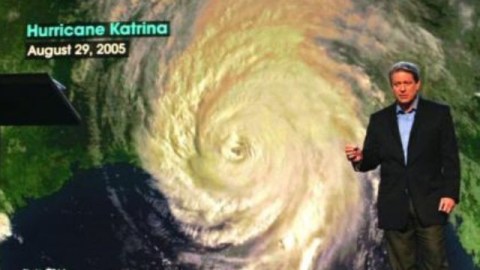Gore Asks Supporters To Donate Twitter & Facebook Accounts to Climate Campaign

In a potentially innovative if not also troubling strategy, Al Gore’s Climate Reality Project has asked their online supporters to donate for one day their Twitter and Facebook accounts to the campaign. The apparent goal on September 14 is to flood the social media networks of supporters with coordinated messages pegged to a 24 hour multimedia event and Internet broadcast. As advertised, the event features a day of presentations by Gore linking climate catastrophe to the efforts of Big Oil, Big Coal, and climate deniers.
In a 2009 paper with John Kotcher (PDF), we discussed the nature of online opinion-leader campaigns related to climate change, focusing on Gore’s WE campaign, recently re-branded as the Climate Reality Project.
Below is the email announcement from the Climate Reality Project asking for the donation of Facebook and Twitter accounts. Following that are excerpts from the paper in which we provide context on the likely impacts, limits, and ethical issues surrounding these types of digital media strategies.
You are our voice — and we need you now more than ever.
On September 14, starting at 7 p.m. Central Time, we will broadcast the reality of the climate crisis from around the globe for 24 hours straight. And to make sure this event gets the attention of the world, we need you to lend your voice to the cause. Specifically, we would like to share your Twitter and Facebook influence.
We have created an innovative tool that allows you to donate your accounts to the cause. If you choose to donate, we’ll be able to access your account to help you post information about the event to your friends and followers. Your donation starts on Sept. 13 and ends on Sept. 15 when the event is over. Click below and authorize us to share our updates through your accounts.
Don’t worry — we won’t have access to any of your personal information. Your accounts will still work normally, and we will only post updates and important details a few times each hour. And if this whole thing doesn’t work for you, you can revoke our access at anytime. What you’re doing is important. You’re lending your voice to ours and amplifying our message. If we want to share the truth about the climate crisis, we need your help.
Donate here: http://climaterealityproject.org/#donate-network
If you don’t have a Twitter or Facebook account, don’t fret. Anything you can do to help spread the word is immensely appreciated. Thanks for your help, Nicole Haber Digital Director The Climate Reality Project.
Here’s the citation to the paper followed by key excerpts from the conclusion:
Nisbet, M., & Kotcher, J. (2009). A Two-Step Flow of Influence?: Opinion-Leader Campaigns on Climate Change Science Communication, 30 (3), 328-354 [PDF]
…With Gore’s [WE campaign] initiative as a model, future climate communication campaigns are likely to make online organizing a central feature of their efforts. Indeed, digital opinion-leader campaigns may be especially appealing because of the relative ease in which organizers can develop metrics to measure success. Yet ease in tracking data does not equate to effectiveness, and we urge caution in over relying on digital networks, especially in place of face-to-face influence. Surveys show that Americans prefer their recommendations via verbal interaction and there still does not exist strong research on whether or not the self-selection biases of the Web can be overcome within these digital networks. Moreover,to date, by all accounts the success of the digital organizing efforts of the We campaign have been relatively modest at best.
With strong selectivity bias online, digital interaction might simply result in ideological reinforcement and intensification of beliefs about climate change, which may eventually limit the willingness of recruited opinion leaders to compromise on pragmatic policy solutions (a typical social movement problem perhaps amplified by the Web). Moreover, if the weak ties of digital interactions lack the strength of traditional opinion-leader influence, then time and effort spent online by digital opinion leaders maybe far less effective than traditional face-to-face influence. The danger of relying too heavily on digital organizing is that it might create a false sense of efficacy among participants, with activists believing they are making a difference on climate change, when impact may be limited at best.
Given these many dimensions of online influence, the goal for both researchers and practitioners is to figure out under what conditions or with which demographic segments digital opinion leaders can be effectively used on climate change, and in which ways can online interactions build on real world ties. Combining digital organizing with face-to-face interaction by using handheld devices such as the iPhone, as was done in the Obama campaign, is a strategy that future climate change efforts should explore….
…Finally, using opinion leaders in public communication campaigns introduces several issues related to ethics and norms. First, opinion-leader campaigns raise general questions about privacy,especially when campaigns are coordinated using micro-targeting or other market segmentation strategies. As a general rule, opinion leaders should disclose their efforts on the part of a campaign, and organizers should follow closely the most rigorous ethical standards in their use of ever more personalized micro-targeting techniques (see Montgomery, 2007,for an overview).
Moreover, adding climate change to the already sizable number of commercial products, which are the subject of opinion-leader or buzz marketing efforts, might simply add to what some warn is the “commercialization of chit-chat,” with citizens growing as distrustful of such situations as they are currently of traditional advertising or the news media (Walker, 2004).
See Also:
Al Gore Seeks to Re-energize His Base with The Climate Reality Project
Communicating About Climate Risks While Avoiding Dire Messaging





